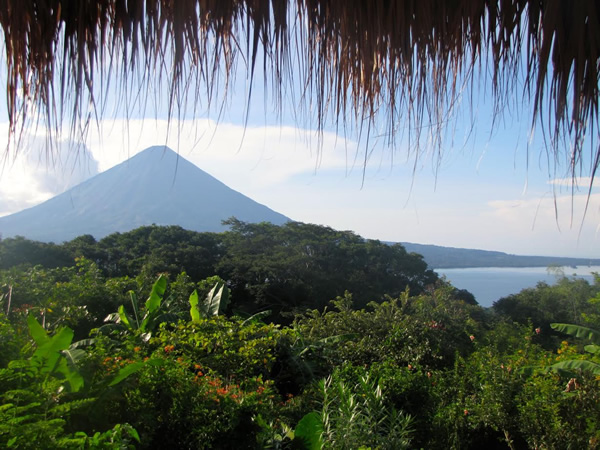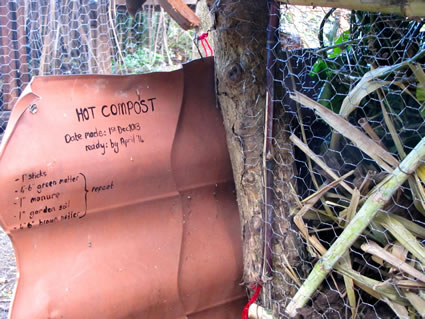5 Keys to Organic Farm Volunteering in Central America
"WWOOFing" Options are Growing
Article and photos by Jonathon Engels

|
|
WWOOFing in the many beautiful regions of Central America.
|
Like many independent travelers, I have a loosely rooted fantasy, envisioning a future disappearance from the grid and settling in a remote jungle location. Within this idyllic haven, acres await cultivation with fruit trees and the nurturing of an organic garden. Knowledge acquisition will occur through textbooks and internet signals, facilitating the construction of thatch huts, the art of winemaking, and year-round bountiful food harvesting.
1. Thinking About Purchasing a Farm One Day? A Hands-On Approach While Traveling and Working Abroad
To enhance my agricultural skills, I've ventured into the world of "WWOOFing" this year. WWOOF, short for World Wide Opportunities on Organic Farms, originally involved weekend volunteering on certified organic farms in Britain. However, this concept has evolved, and "WWOOFing" has become both a verb and an umbrella term encompassing various farm tasks like construction, permaculture, and animal care. In exchange for your efforts, you receive room and board. This idea has gained popularity and extended its reach to numerous corners of the globe.
With the rise of similar organizations such as HelpX and Workaway, volunteering on organic farms via the Internet is no longer exclusive to the vast WWOOF organization. HelpX also posts hostel work exchanges and NGO positions and only requires a one-time fee for access to opportunities worldwide. In contrast, WWOOF asks for dues in each individual country. So, I found my first set-up at Totoco Organic Farm, on a little island called Ometepe in Lake Nicaragua, via HelpX.
2. Join the Dreamers: An International Trend
Vanishing into the sultry embrace of the tropics might appear as a solitary, unconventional pursuit. Share your plan to live off the Central American land with your mom, and she might just pause in astonishment. However, the truth is, audacious leaps like these are becoming routine in the global community. In fact, here on Ometepe Island, you'll find at least three organic farms — Bona Fide, Totoco, and Zopilote — that welcome volunteers with open arms.
Are you interested in going somewhere else for agricultural work? Check out Transitions Abroad’s lengthy list of organizations putting people in places all around the world: Farm Work Abroad
And that's just the tip of the iceberg — there's even an organic lettuce farm and a dozen smaller ventures I've come across. In essence, the secret's out about the allure of vanishing into the tropical paradise for a different kind of existence. It's increasingly challenging to responsibly carve out a sustainable niche in the wilderness without stumbling upon someone who beat you to it just a mile down the trail. The silver lining is that these fellow pioneers are more than willing to share their experiences, insights, and challenges with newcomers and enthusiastic WWOOFers. It's almost as if this phenomenon is a revival of the latent Henry David Thoreau in many of us.
3. A Responsible Life Takes a Lot of Time, Work, and Persistence
Achieving a sustainable life off the land demands an abundance of time, hard work, and unwavering dedication. Just because others have embarked on the journey doesn't mean starting an organic farm with an attached eco-lodge and sponsored NGO is a walk in the park. Martijn, the owner-manager of Totoco, has gathered his wisdom through numerous setbacks along the way. Presently, the hotel is gaining momentum, and the Totoco Foundation has evolved into a source of tremendous goodness. However, the farm is still struggling to find its solid footing.
Even though Totoco Farm has been in existence since 2008, it continues to aspire towards sustainability. My stay here has primarily involved constructing new structures and revamping the old ones. I began by crafting a chicken roost and nighttime coop from scavenged wood. Together with fellow volunteers, I undertook the task of refurbishing composting bins to enhance their efficiency. Currently, I'm engrossed in creating a fresh section of the garden, where we plan to cultivate passion fruit, herbs, a local superfood known as katuk, and galangal, an Asian spice that adds zest to soups.
However, it's important to note that I won't witness the completion of these projects. Initially planning for a three-week stay, I extended it to just over seven weeks. As I approach the final stretch, there are still no chickens, and consequently, no farm-fresh eggs. Even the rapidly decomposing hot compost pile has five more months to go before it transforms into nutrient-rich soil. As for the new garden, I'm simply hoping to see a few seedlings planted before my departure. Farming is an inherently gradual process, even when things are progressing well, and it's a work that's never truly complete.

|
|
Composting at an organic farm produces great produce, but is hard work.
|
4. Books About Farm Work Are Great But No Substitute for Experience
Books are invaluable sources of knowledge, but they can't fully prepare you for the reality of hands-on experience. Martijn embarked on his project prepared with extensive reading, foolproof plans, and minimal practical experience. While books offer a wealth of information, and even the jungle provides Wi-Fi for quick references, nothing truly equips an aspiring farmer for the challenges posed by massive insects, six months of relentless rains followed by an equal stretch of scorching, arid weather, or the logistical struggles of obtaining essential items like food, nails, and tomato seeds when living in the heart of the jungle.
Interestingly, one of those books, John Seymour's "The New Complete Book of Self-Sufficiency: The Classic Guide for Realists and Dreamers," will undoubtedly find a place on my future bookshelf. It has imparted comprehensive knowledge about composting, along with valuable gardening insights and, perhaps more information than I ever wanted, about DIY animal slaughter.
In the beginning, Martijn followed a path I would likely have taken: collecting heirloom seeds from his home country (where such seeds are available), planting them here, and witnessing the local wildlife indulge in an exotic feast. Ultimately, he's left with fewer than twenty successful crop varieties, most of which contribute little to the dinner table in terms of volume. After all, there's only so much spinach and hibiscus leaf salad paired with mint-lemongrass tea that one can consume before yearning for the convenience of a supermarket.
5. Embrace the Reality that the WWOOF Organic Farming Experience Must be Perpetually Renewed
A member of WWOOF must come to terms with the fact that this lifestyle entails a cycle of starting anew, over and over again. Martijn constantly evolves his plans and approaches. Presently, he aims to leverage the roughly 20 successful crops to create marketable products like Totoco organic herbs and spices, experiment with hydroponics (a sustainable and highly technical fish-plant farming method), and allow locals and local produce to take the lead in the garden. However, what he, and likely most farmers of this kind, hasn't achieved is reaching, or even getting close to, a definitive endpoint.
If you haven't delved into permaculture yet — a farming and living philosophy gaining increasing recognition — it's certainly worth exploring. It revolves around harmonious collaboration with nature rather than rigorous cultivation and has been around since the 1970s. It offers a fascinating, though not entirely novel, approach to cultivating crops.
You see, for every compost bin filled, it eventually requires emptying. Each successful seed demands planting, harvesting, and replanting in due course. Maintaining chicken coops, especially in the grueling, muggy jungle conditions, involves perpetual cleaning and repairs. In between crops, soil must be rejuvenated, meticulously tilled, usually by hand, enriched with manure and compost, and freed from weeds. Meanwhile, there's the essential task of feeding oneself.
Then, it’s back to work. That’s farm living, even in paradise.

|
Jonathon
Engels earned an MFA in creative writing.
He has lived, worked and/or volunteered in seven
different countries, traveling his way through
nearly 40 countries between them. His many interests include permaculture, veganism, and ways to live sustainably.
|
|
